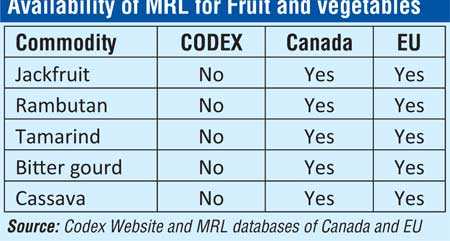Monday Mar 02, 2026
Monday Mar 02, 2026
Wednesday, 19 September 2018 00:00 - - {{hitsCtrl.values.hits}}
 Due to increased emphasis on consumer health, majority of developed countries such as EU, Japan and the US insist on MRL testing of food items which has to be done by the exporter.
Due to increased emphasis on consumer health, majority of developed countries such as EU, Japan and the US insist on MRL testing of food items which has to be done by the exporter.
The Codex Alimentarius Commission which is an inter-governmental body with over 180 member countries and sponsored by Food and Agriculture Organization (FAO) and the World Health Organization (WHO) has prescribed Maximum Residue Levels for various food items. However, in Sri Lanka, only a handful number of institutions provide the services of MRL testing and there are some capacity constraints also.
Implications
for exporters
Generally, when exporting to EU, the exporters have to do the MRL testing for around 480 chemical substances. This would mean, exporters have to send samples to overseas for testing because of the capacity constraints of laboratories in Sri Lanka. Consequently, exporters have to spend more time and money to for the MRL testing.
The high cost of testing affects the profitability of exporters in general and small and medium scale exporters in particular. This high cost of testing for MRL has to be viewed in the context of the majority of agricultural product exporters not enjoying higher profit margins unlike some other product exporters. 
In a situation where the exporters have to send samples to overseas laboratories, it takes a lot of time as the samples has to be delivered via courier and then the time required for testing and finally getting the test results.
Considering the perishable nature of the agricultural commodities, exporters cannot wait a long time to get the laboratory reports which may in turn will lead to loss of market opportunities and affect competitiveness.
Another interesting observation is that there are no CODEX standards for certain fruits and vegetables. For example, there are several fruits and vegetables that are cultivated in Sri Lanka such as rambutan, tamarind, jackfruit, cassava and bitter gourd for which no CODEX standards available.
According to the table, it is clear for certain fruit and vegetable items there are no CODEX and MRL standards although countries like Canada and EU established their own MRLs. Absence of CODEX MRL standards for certain fruits and vegetables may be an obstacle for exporting countries as the CODEX is the universal guideline to compare the MRL established by importing countries.
CODEX standards are not mandatory, they are only voluntary standards. However, according to Article 3 of the WTO SPS agreement, member countries are encouraged to harmonise national SPS measures with international standards. Therefore, non-availability of the CODEX MRL standards for some fruit and vegetable items as pointed out above, make the importing countries are unable to harmonise their own national standards because the CODEX is the universal guideline relating to MRL.
According to the article 2 of WTO SPS agreement, member countries have the freedom to adopt sanitary and phytosanitary measures as long as such measure are based on scientific principles, scientific evidence and non-discriminatory, among member countries. Therefore, importing countries can justify MRL levels varied from CODEX based on the above premise. However, the question is whether adoption of stringent MRL standards which exceed the CODEX standards is a hidden form of protectionism or not.
Improving
local capacity
Presently the majority of buyers that insist on MRL testing are from developed countries. Buyers from Maldives, Middle East and other developing countries are not that concerned about MRL testing although there may be exceptions.
But in future, with the increasing attention on consumer health relating to food items, MRL testing will be a mandatory requirement for all agricultural exports. Therefore, Sri Lanka has to prepare for such a situation by improving the capacity of both public and private laboratories in the country.
(This article is based on research carried out by the writer. The writer can be contacted via [email protected].)